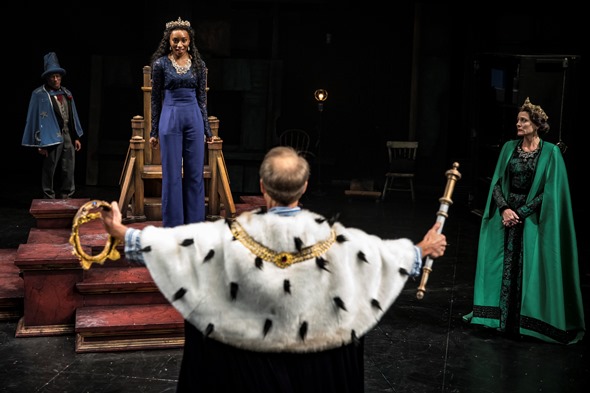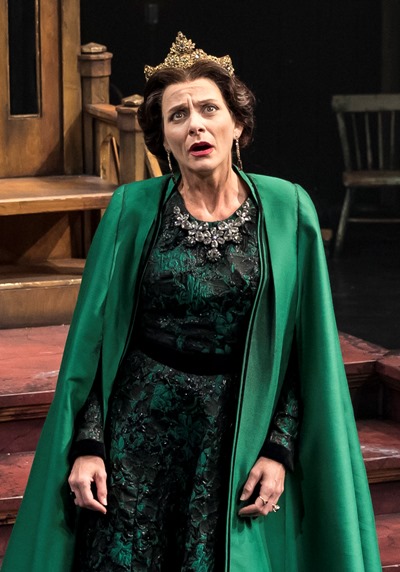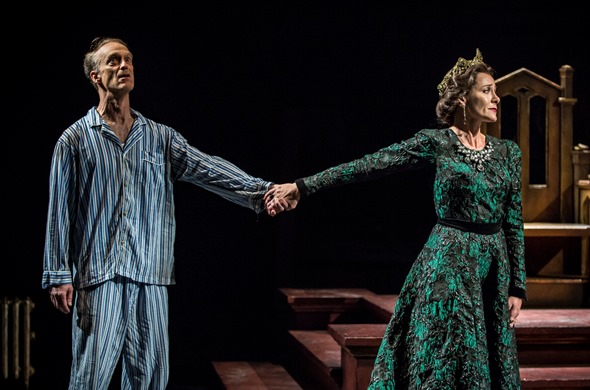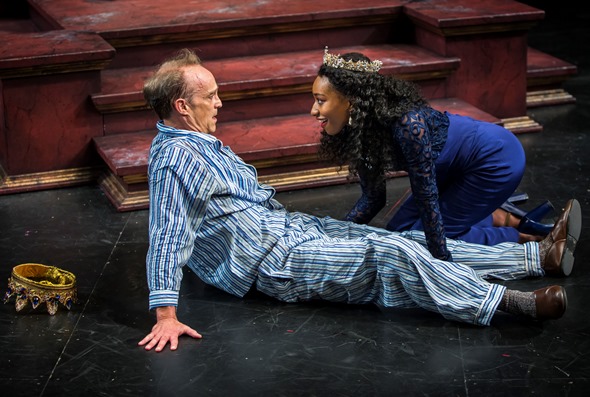‘Exit the King’ at American Players Theatre: Why would an absolute ruler accede to death?
Review: “Exit the King” by Eugêne Ionesco, at American Players Theatre through Sept. 25. ★★★★
By Lawrence B. Johnson
SPRING GREEN, Wis. – Eugêne Ionesco’s play about dying, “Exit the King,” generally comes under the rubric of absurdist drama. But that tag doesn’t really fit the play. If a label is required, perhaps “figurative” – certainly, existential. An absorbing and quite affecting account at American Players Theatre rings with truth about that juncture in life where few arrive gladly: its end.
 The King is very old; ancient. It’s safe to say he has lived too long. He once had great power over everything, but in his dotage he has watched his kingdom crumble – literally fall apart, not just politically but materially, structurally – to the point where he holds dominion over nothing. Even the population of his realm has shrunk to near zero. And now the King himself is dying.
The King is very old; ancient. It’s safe to say he has lived too long. He once had great power over everything, but in his dotage he has watched his kingdom crumble – literally fall apart, not just politically but materially, structurally – to the point where he holds dominion over nothing. Even the population of his realm has shrunk to near zero. And now the King himself is dying.
Anyway, that’s what his doctor tells him, and the unwelcome news is supported by the King’s former Queen, Marguerite. But his new and nubile consort, Queen Marie, lovely and vapid in equal measure, dismisses the unhappy idea of royal mortality. The King will be fine, she tells his recumbent form. She is full of life and so must be the King.
The narrative of “Exit the King,” exceptionally linear and trackable for Ionesco and “absurdist” plays as a rule, is the story of the King’s final hours and, one might say, of the angel who comforts him, reassures him and allows him to make his exit in acceptance and peace.
That bearer of divine grace is the erstwhile queen, Marguerite, played by Tracy Michelle Arnold with external severity but also radiantly transparent love for her weathered and unwise old companion, this perdurable monarch now become fool.
Such is the pajama’d King portrayed by James Ridge, a wizened, tired and pathetic hank of royalty who clutches the last rays of life much the way he clings to the scepter in his hands: with deluded and pointless conviction. He is not going to die; of course, not. He is the King, absolute ruler. Perhaps the kingdom has not fared so well of late, but he will revive it. The fresh young beauty, his Queen Marie (the bright-eyed and vivacious Cassia Thompson), is his assurance of life perpetual. This is hardly a time for talk about dying.
His doctor, however, urges the opposite perspective as persistently as the subject of a King might risk doing. John Pribyl cuts a figure of confident authority as the exasperated physician who wants the King to acknowledge the reality of his rapidly approaching end. With increasing impatience, the doctor presses an inexorable truth into the King’s consciousness: He is going to die, and soon.
What might appear as absurd, the merry-go-round of rationale insistence followed by wan denial, in fact resonates deeply of genuine mortal fear of life’s end. The solidly framed doc looks like a guy in ruddy health. Easy for him to badger the King about just lying down and breathing out his last. But the King is the King. This is his throne room, his dominion, his life. A King rules in perpetuity.
I suppose one might think of “Exit the King” as a love story, with nothing in the least absurd about it. Marguerite knows the failing King best; it is she who has his most profound interest at heart; it is her voice whose wise and honest judgment has shored up his own in days long gone.
 Now she speaks again, without rancor, without bitterness or petulance. In a long, almost mystical monologue that Arnold delivered with Zen-like equanimity and comforting directness, Marguerite illuminates the King’s mind, or perhaps his soul, with the torch of cosmic truth. She confers upon him the gift of transcendence.
Now she speaks again, without rancor, without bitterness or petulance. In a long, almost mystical monologue that Arnold delivered with Zen-like equanimity and comforting directness, Marguerite illuminates the King’s mind, or perhaps his soul, with the torch of cosmic truth. She confers upon him the gift of transcendence.
“Exit the King,” judiciously paced by director Tim Ocel in the intimacy of the 200-seat Touchstone Theatre, may be the sleeper play of APT’s current summer. Michael Ganio’s simple set – little more than a wooden throne on a bare stage – only accents the striking attire of the two queens and the regally cloaked pajamas of His Highness.
In an absurdist play ironically marked by little mirth, Casey Hoekstra’s exuberant cavorting and proclamations as the palace guard cut across the prevailing seriousness to jolting, bizarre effect – outlandish reminders of a monarchy that’s way past its sell date.
Related Links:
- “As You Like It” at American Players: Read the review at Chicago On the Aisle
- Preview of APT’s complete summer season: Read it at Chicago On the Aisle
Tags: Casey Hoekstra, Cassia Thompson, Eugêne Ionesco. American Players Theatre, Exit the King, James Ridge, John Pribyl, Michael Ganio, Tim Ocel, Tracy Michelle Arnold




